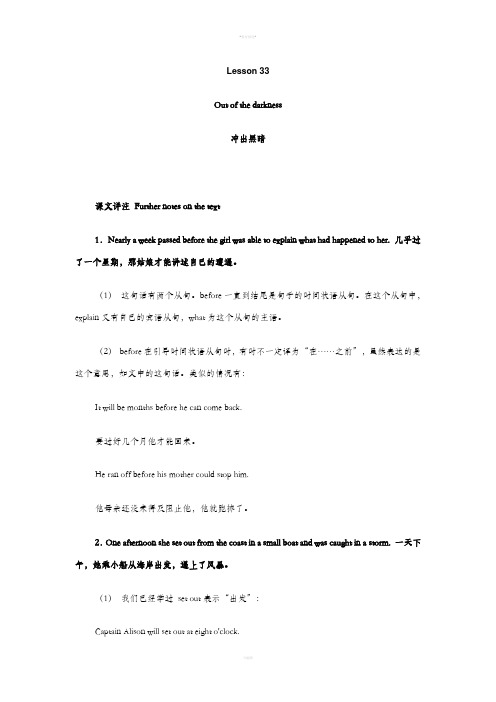新2第33课-威廉老师
- 格式:doc
- 大小:61.50 KB
- 文档页数:9

Lesson 33Out of the darkness冲出黑暗课文详注Further notes on the text1.Nearly a week passed before the girl was able to explain what had happened to her. 几乎过了一个星期,那姑娘才能讲述自己的遭遇。
(1)这句话有两个从句。
before一直到结尾是句子的时间状语从句。
在这个从句中,explain又有自己的宾语从句,what为这个从句的主语。
(2)before在引导时间状语从句时,有时不一定译为“在……之前”,虽然表达的是这个意思,如文中的这句话。
类似的情况有:It will be months before he can come back.要过好几个月他才能回来。
He ran off before his mother could stop him.他母亲还没来得及阻止他,他就跑掉了。
2.One afternoon she set out from the coast in a small boat and was caught in a storm. 一天下午,她乘小船从海岸出发,遇上了风暴。
(1)我们已经学过set out表示“出发”:Captain Alison will set out at eight o'clock.艾利森船长将于8点钟启航。
set out from表示“从……出发”。
(2)be caught in表示某人“(突然)遇到/上(风暴等)”:He was caught in a heavy rain on the way home.他在回家途中遇到了大雨。
3.Then she swam to the shore after spending the whole night in the water. 她在海里游了整整一夜才游到岸边。

Lesson 33Out of the darkness冲出黑暗课文详注Further notes on the text1.Nearly a week passed before the girl was able to explain what had happened to her.几乎过了一个星期,那姑娘才能讲述自己的遭遇。
(1)这句话有两个从句。
before -直到结尾是句子的时间状语从句。
在这个从句中,explain又有自己的宾语从句,what为这个从句的主语。
(2) before在引导时间状语从句时,有时不一泄译为“在......之前”,虽然表达的是这个意思,如文中的这句话。
类似的情况有:It will be months before he can come back.要过好几个月他才能回来。
He ran off before his mother could stop him.他母亲还没来得及阻止他,他就跑掉了。
2.One afternoon she set out from the coast in a small boat and was caught in a storm.一天下午,她乘小船从海岸出发,遇上了风暴。
(1)我们已经学过set out表示"出发":Captain Alison will set out at eight o'clock.艾利森船长将于8点钟启航。
set out from表示"从.. 出发(2) be caught in表示某人"(突然)遇到/上(风暴等)”:He was caught in a heavy rain on the way home・他在回家途中遇到了大雨。
■3・ Then she swam to the shore after spending the whole night in the water.她在海里游了整整一夜才游到岸边。




Lesson 33 Out of the darkness【New words and expressions】(12)darkness n. 黑暗explain v. 解释,叙述coast n. 海岸storm n. 暴风雨towards prep. 向,朝;接近rock n. 岩石,礁石shore n. 海岸light n. 灯光ahead adv. 在前面cliff n. 峭壁struggle v. 挣扎hospital n. 医院★darkness n. 黑暗in the darkness 在黑暗中(在没有光线的情况下)★explain [iks5plein] v. 解释, 叙述explanation [7eksplE5neiFEn] n. 解释Could you give me an explanation? 能给我一个解释吗?interpret [in5tE:prit] v. 解释, (强调翻译)语言之间的解释interpreter [in5tE:pritE] n. 解释程序,解释者,口译人员,翻译员,讲解员interpretation [in7tE:pri5teiFEn] n. 解释, 阐明, 口译, 通译interpretress [In`t\:prItrIs] n. 女翻译员★coast n. 海岸(地理意义上的海岸, 海岸线等, 感觉旁边是岩石, 很陡峭seashore n. 海岸(跟游玩有关系, 为了游玩的)seaside n. 海边seashore/ seaside 给人的感觉是旁边是沙滩, 可以进行日光浴的感觉bank n. 河岸,坝,堤(两边比水面高)★storm n. 暴风雨 (只解释为“风暴”)snowstorm n. 暴风雪thunderstorm [5WQndEstC:m] n. [气]雷暴,雷雨rain heavily 表示雨下得很大pour [pC:, pCE] v. 灌注, 倾泻, 涌入, 流, 倾盆大雨The rain is pouring. 倾盆大雨It's raining cats and dogs. 滂沱大雨★towards prep. 向, 朝, 接近towards 强调nearer and nearer(强调越来越近)★rock n. 岩石, 礁石rock 表示huge stone (huge[hju:dV] adj 巨大的, 极大的, 无限的)★ahead adv. 在前面a开头的词(asleep,awake,alive,ahead,alight…)往往是表语形容词。
不管是作表语形容词,还是副词,都放在名词的后面,一般形容词放在名词的前面ahead 的用法:① 放在被修饰词的后面作定语, 定语后置light ahead 前方的灯光② ahead of…在……前面He went ahead of me. 他走在我前面③ go ahead朝前走;请随便(回答请求时用)--Would you mind my using your telephone? / Can I use your telephone?--Ok, go ahead.--Can I smoke here?--Go ahead. /Sorry +一个原因(可能是事实, 可能是个借口)★hospital v. 医院hospital前面是否加the,和它的功能有关系,一旦+the, 只表示地点go to hospital 看病; go to the hospital 去医院(看望病人)in hospital 住院; in the hospital 在医院【Text】Nearly a week passed before the girl was able to explain what had happened to her. One afternoon she set out from the coast in a small boat and was caught in a storm. Towards evening, the boat struck a rock and the girl jumped into the sea. Then she swam to the shore after spending the whole night in the water. During that time she covered a distance of eight miles. Early next morning, she saw a light ahead. She knew she was near the shore because the light was high up on the cliffs. On arriving at the shore, the girl struggled up the cliff towards the light she had seen. That was all she remembered. When she woke up a day later, she found herself in hospital.参考译文几乎过了一个星期, 那姑娘才能讲述自己的遭遇. 一天下午, 她乘小船从海岸出发, 遇上了风暴. 天将黑时, 小船撞在了一块礁石上, 姑娘跳进了海里. 她在海里游了整整一夜才游到岸边. 在那段时间里, 她游了8英里. 第二天凌晨, 她看到前方有灯光, 知道自己已经接近岸边了, 因为那灯光是在高高的峭壁上. 到达岸边后, 姑娘朝着她看到的灯光方向挣扎着往峭壁上爬去. 她所记得的就是这些. 第二天她醒来时, 发现自己躺在医院里.【课文讲解】1、Nearly a week passed before the girl was able to explain what had happened to her.nearly adv. 将近nearly a week 快一个星期了“一段时间以后”句型:sometime later…Three days later, my mother returned. (强调某人做某事,简单句) Three days passed and then my mother returned.并列句, 既强调某人做某事, 又强调时间(有多久)…passed before…Three days passed before my mother returned.强调时间(这么久的时间, 时间状语从句, 后面是从句)be able to强调有能力, 且能够成功(还强调成功);can 只表示能力I can swim across the river. 我能游过这条河(但没有游过,不知道能不能成功)I was able to swim across the river.2、One afternoon she set out from the coast in a small boat and was caught in a storm.set out = set off = begin a journey 出发set out from…从……出发be caught in+灾难(突然)遇到/上(风暴等)be caught in a earthquake (earthquake [5E:Wkweik] n. 地震)I was caught in a rain. 我遇上了一场雨As soon as he left, it began to rain.He was caught in a rain when he left. 他刚一离开, 就下雨了遇上人用meet, 遇上灾难用be caught in…3、Towards evening, the boat struck a rock and the girl jumped into the sea.towards evening 天越来越晚strike强调的往往是猛烈的撞击4、Then she swam to the shore after spending the whole night in the water.“to”强调朝那个方向去, 但没有强调越来越近;“towards”朝那个方向去,强调距离越来越近5、During that time she covered a distance of eight miles.cover可笼统地表示“行过(一段路程)”,根据上下文可具体译为“走过、飞过、游过”等。
The bird covered the distance in three minutes.a distance of+具体长度多长的距离,表示具体的距离the red army covered a distance of 25000…两万五千里长征6、Early next morning, she saw a light ahead.a light ahead 前方的一盏灯(ahead 放在被修饰词的后面)7、On arriving at the shore, the girl struggled up the cliff towards the light she had seen.“on +动名词”相当于一个由as soon as=the moment或when引导的时间状语从句,as soon as=the moment后面要加句子,on 后面一定要加动词ing, 承认动词是由主句主语做的On reaching the airport, he was arrested by the police.“…up the cliff towards the…”用两个介词起到动词的作用,up在此处为介词,表示“沿着……往上”8、That was all she remembered.all作表语,是先行词, she remember 修饰 all 作定语从句, 省略 thatThat was all I wanted to say. 那就是我想说的全部That was all I can do for you.=I can do nothing else for you.9、When she woke up a day later, she found herself in hospital.find +宾语+宾补发现……(宾补可以由形容词或介词短语充当)find the books tidy 发现书摆放得整齐I found the books in order.When I woke up, I found myself in bed.【Key structures】表示方向和目的地的介词和副词① 表示“上、下”的两对小品词是on和off,up和downJim’s standing on the roof. I hope he won’t fall off.T om’s climbing up the tree. I hope he won’t fall down.② 表示“来、去”的一对小品词是from和to;towards(强调越来越近)的意义和to(强调目标)相近,表示“朝,向,接近”等;for在有些动词后面也表示“往,向”的意思The ball was coming towards me.The plane flies from Moscow to New York.He went for home.leave for…动身到某地(强调离开,出发)Yesterday my father left for Tianjin.set out for…动身到某地He left/ set out for New York yesterday.head for/to 前往(强调“去”)③ 表示“进去,出来”这两种方向的介词为into(进、入)和out of(从...出来);表示“在某个地方”或“在……里面/外面”可用at(含有一种瞄准的概念,方向性),in,out of等;表示目的地或位置往往用ataim at,fire at(瞄准开火),throw at,threw to the bankTell him go into my house.Did you stop anywhere on your way to the office?去办公室的路上你在别的地方逗留过吗?④ 表示“穿过,越过,绕过”等动词时,往往用through,across,under,over,round等介词How did you get through the fence? 你怎么穿过篱笆的?How did you get over the wall?【Special difficulties】Pass and Pastpass和past的区别主要是词义上的区别,pass是动词,其过去式为passed,过去分词是passed或past。